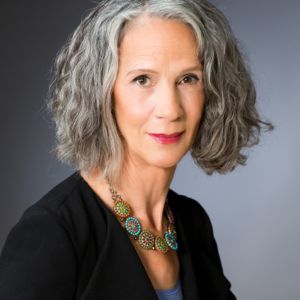In this episode of Lessons from Leaders, Lynne Gilliland sits down with Abby Maxman, CEO and President at Oxfam America, who shares her triumphant story of failure – “failing forward.” Abby delves into her 30+ years of working in the field of international humanitarian relief and development and highlights the lessons she has learned along the way.
Below is an abridged excerpt from the episode, watch the video to hear the entire interview!
Lynne: To start, I would love for you to tell us a little bit about your background and how it is you got to be where you are.
Abby: While I did not know it at the time, I have had my moments, these critical incidents in life. I look back now and have these memories that really struck me and have become very meaningful. I recall seeing photos of the famine in Ethiopia in 1984. I was on my way to college and only just realizing how it could be that this kind of starvation could happen at that scale. My journey has led me to see that these are political issues, the politics of poverty, famine and injustice.
After I graduated college, I wanted to do something and do good! After a series of forks in the road, I ended up joining the Peace Corps, working in southern Africa when apartheid was still strong, and HIV/AIDS was just at its beginning. Again, I saw what was happening in southern Africa through the lens of social justice, as well as the issues of poverty and inequality that were very pervasive there. My journey had me working in different parts of the aid architecture to post-genocide Rwanda, where I worked with another big NGO, CARE. I had a long career with them working all over the world on operations and programs and overseeing their global operations for several years. I then moved into more of a governance role in Geneva as Deputy Secretary General there prior to me coming to Oxfam. That really helped me, again, look at the issues of power holders and where power lies and making change happen in policy in the enabling environments. I would look at issues of social position and those who have influence over decisions that affect people’s lives. And then began my journey to Oxfam.
You didn’t start out with this vision of “I will do this, and then I will do that…” It seems like there is more jigging and jiving, right?
In a way, yes. There is that first moment when you ask, “What am I going to do?” I wanted to do good, but I did not know how I was going to do that, what was going to get me there. I had all of this agency and desire, high hopes and big ambitions. Really, it was out of failure. I had applied for a fellowship my heart was set on. Going on the path that was the Peace Corps was not my first choice. My heart was broken. I did not get the fellowship but that was a wonderful thing to happen for me. It opened up my world in different ways. From there, when I look back, there was a sort of logical evolution of my work. Everything was building upon the foundations of what I was doing. I started out as a community development and agriculture extension worker. Then I started working in program and project management when I joined CARE in Rwanda. Overall, it was a lot of program and operations management. When you look at the arc of my career, and the many roles I have had, it looks very intentional. I did learn the hard way, though. When I was younger, I made some choices and left a role I loved for a role that paid more money but learned that did not do it for me. My head and my heart were not motivated.
I am wondering, with the vision of what you wanted to create, what you wanted to be different in the world and now, with where you are in the seat of power – what were the struggles or successes toward accomplishing that vision?
Some of my biggest learnings that I have built upon is that whatever the technical solution is, you need excellent, technical people with technical capabilities. But that is only part of the equation. What I have really appreciated and brought to the work is that “How do you bring people along?” aspect. No matter how smart a solution any great person thinks they might have, we are working in culture environments, complex environments. There is a whole range of issues that need to be addressed. I think the work I do reinforces my deep belief that policy advocacy influences change, the ones that really take impact to scale. However, in order for me to feel fulfilled, personally and professionally, that is not enough. I like personally connecting with the individual. Thinking about their immediate lives, as well looking at the long-term systemic structural solutions which often are enmeshed with policy issues and other societal issues around power. Helping save lives in disaster while helping people build better long-term futures for themselves, while also tackling that policy framework, for me that’s a real driver and motivator of how change happens.
What do you think about failure?
I believe that failure is only failure if you don’t learn from it, if you don’t actively apply the learning from what happened…
I have had a situation where, competing for what was a nearly 94 million-dollar, multi-year program, I was leading and making choices about partnering with another organization and knew that my organization had real strengths and great things to offer. We made choices and agreements, and as we got closer to the submission datedate, there were things that the organization I was agreeing with and committed to partnering with was acting in ways that didn’t align with my values in how they were working with local partners and some of what was being said and done. It got to a point where I dropped out of the bid. This was nearly a 100 million-dollar decision. It’s not something that’s easy to explain. It’s people’s job security and other program leverage is built on it, but I couldn’t, in good faith, continue working onin that. In fact, I like to think right would have been done, had we stayedwe even stayed in, but it would have felt wrong because of some of those behaviors.
Making those choices are very difficult. Some people are not that sympathetic to the feeling that I was doing the right thing, but I wasn’t going to compromise! But making sure I look back at that learning and think about moments in the lead up of what could have I done in following my instincts earlier so it wouldn’t have been an instance of me dropping out and pulling our organization out completely. Maybe I should have seen some of the writing on the wall earlier so I could have made a bid myself.
Now, looking back at how does one fail gracefully? How do you make sure people understand the underlying principles, why decisions are made? Be open to learning from them and keep moving and bring your best ideas. The real thing is getting up and trying again and keep moving even after bad things happen. That’s the real test of what kind of leader you are: when you’re under fire or when things go badly. It’s very important.
So it seems like there’s so many layers to failure. It’s a continuum. There’s also the reality that we’re going to make mistakes. We’re human. You look back, pulling out from that RFP, and say, “There are the signs.” What I am getting to is that we are going to do the best we can. We will make mistakes. But part of it is recognizing that we learned a lesson, but let’s not self-flagellate. Let’s move on quickly. It’s not your fault, it’s not their fault and none of this, “If we had done it differently, we wouldn’t be in this pickle.”
Yes. Don’t blame and don’t finger point. Some mechanism such as doing after-action reviews not too long after a crisis or situation happen. I’ve done many of all kinds, be it in response to a natural disaster or kidnapping or in the case of what Oxfam has gone through in the past year and a half when things surfaced in the media last February about events from Haiti in 2011. Looking at what that meant to the organization around sexual misconduct and living our values. It really was a very jarring event for my staff, for our work. Even then, making sure we did an after-action review about our response, not just about everything that was going on but my leadership, our crisis management team…How did we mobilize to respond in a values-driven way fundamentally, to come together, to respond to something that we hadn’t expected that was really rocking, not just to the organization, but the sector, and how did we want to lead through it. Making it a “we” thing, not an “I” thing. It’s the commitment to learning about that so that you can course correct and make changes and hopefully get feedback. I want to take that feedback and look in the mirror and can see the intent of what I did versus the impact of what happened. I need to see the disconnect. Intent is one thing, but I have to be self-aware enough about the impact I’m having on others at a moment in time.
You and I talked briefly about feminist leadership. What advice do you have for women coming up?
I’m 30+ years into my career and I love it. I am just as youthful and enthusiastic about what I do, what I can learn. There’s never a day that goes by where I would ever look at the clock or ask when is it going to end. It’s more of, “Oh my gosh! Where did the time go?!” I can learn from every interaction. In every interaction, someone brings a new idea.
Be open to learning. None of us have to know everything. Even if we might think we know, even if we know that we know. Bring your open self, with purpose, intent and awareness. Bring that to every interaction because it will never be boring.
Head over to Lynne Gilliland’s website where you can also listen to many of her podcast episodes.


